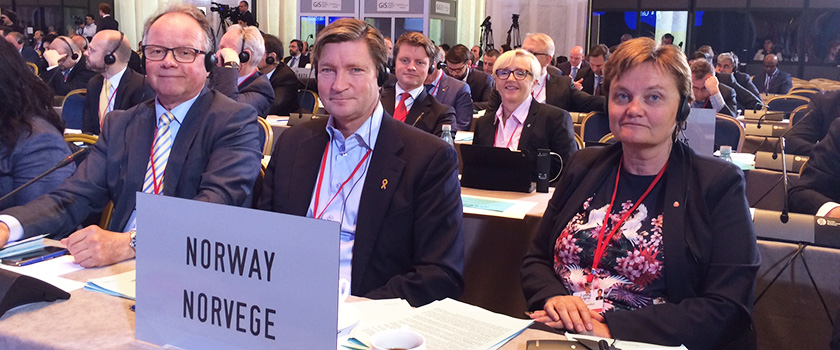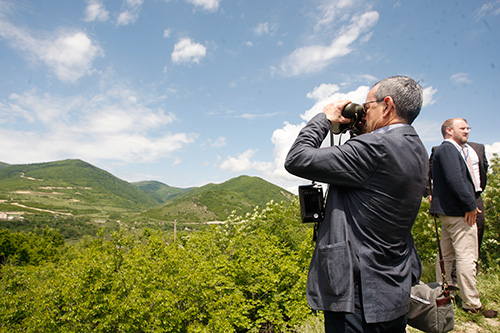
Members of the Norwegian delegation in Tbilisi. From the left, first row: Øyvind Halleraker, Christian Tybring-Gjedde and Rigmor Aasrud. From the left, back row: Peter Christian Frølich and Liv Signe Navarsete. Photo: Storting.
NATO PA adopts resolution on Georgia’s Euro-Atlantic integration
NATO’s Parliamentary Assembly (NATO PA) held its spring session in Tbilisi, Georgia, 26 to 29 May.
Following a visit to the administrative boundary line which Russia has established surrounding the separatist republic of South Ossetia, the Assembly adopted a resolution to support continued Euro-Atlantic integration for Georgia.
The representatives from the Storting were Øyvind Halleraker (head of the Storting’s delegation to NATO PA), Sverre Myrli (deputy head), Christian Tybring-Gjedde, Rigmor Aasrud, Liv Signe Navarsete and Peter Christian Frølich.
Russia’s attempts at destabilising its neighbouring country and undermining democratic processes and institutions in Western countries were among the main topics of discussion at the spring session. Rasa Jukneviciene, member of the Lithuanian Parliament, presented a report on NATO’s relationship with Russia and encouraged NATO to be firm and direct in its communication with Moscow.
The Assembly also discussed reports on how NATO should handle cyber threats, the misuse of social media and Russian misinformation campaigns intended to influence popular opinion in NATO member countries.
Challenges in the North

The President of the NATO PA, Paolo Alli, inspects the administrative boundary line to South Ossetia. Photo: Storting.
Earlier this month, the Storting’s NATO PA delegation hosted a seminar in Svalbard. This formed the backdrop for a report on security challenges in the Arctic, which was discussed in Tbilisi. In his speech, Øyvind Halleraker, the Storting’s head of delegation to the NATO PA, emphasised that the High North is not a lawless area but a region characterised by positive cooperation and respect for international law.
Liv Signe Navarsete underscored the importance of search and rescue operations in the Arctic and the good Norwegian-Russian collaboration as well as the ever-closer cooperation on search and rescue issues in the Arctic Council.
“I am therefore sceptical as to whether NATO should develop its own search and rescue capabilities in the Arctic,” said Ms Navarsete.
Øyvind Halleraker picked up the topic in a question to NATO’s Deputy General Secretary, Rose Gottemoeller:
“The Arctic region is an area undergoing rapid change and of great strategic importance to the alliance. What role do you envisage for the alliance in the Arctic in order to increase monitoring capabilities in the Arctic?”
Ms Gottemoeller responded that the alliance largely relies on the Arctic countries to monitor the Arctic situation. She also said NATO needs the Arctic countries to guide the alliance on its role, based on their experiences and expertise.
The distribution of costs in NATO
Another important topic of discussion was achieving fairer cost sharing in NATO. With reference to the NATO summit in Brussels the day before the NATO PA meeting, many parliamentarians argued for a better and more appropriate way of calculating national contributions to security than the current target of 2% of GDP going to defence. It was pointed out that this figure can often be misleading.
Delegation leader Øyvind Halleraker highlighted Norway’s contribution of effort and investment to safeguard both Norwegian and NATO interests in the north.
“The purchase of new fighter planes, surveillance planes and submarines illustrates Norway’s significant contributions to NATO,” said Mr Halleraker.
Last updated: 30.05.2017 14:37